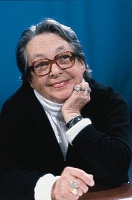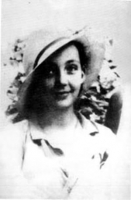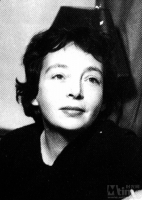阅读mǎ gé lì tè · dù lā sī Marguerite Duras在小说之家的作品!!! | |||||||||||||||
1924 nián tā zhù zài jīn biān、 yǒng lóng、 shā lì。 tā mǔ qīn zài bō léi nuò( jiǎn bù zhài) mǎi liǎo yī kuài bù néng gēngzhòng de tǔ dì。
1939 nián tā tóng luó bèi 'ěr · áng tài 'ěr mǔ jié hūn。
1940 nián -1942 nián tā tóng fěi lì pǔ · luó kè hé zuò, zài gā lì mǎ chū bǎn shè chū bǎn《 fǎ lán xī dì guó》。 zài shū yè jù lè bù gōng zuò,《 tǎ nà lǎng yī jiā》 zāo dào gā lǐ mǎ chū bǎn shè de jù jué。 tā dì yī gè hái zǐ yāo wáng。 tā de xiǎo gē gē zài zhōng guó kàng rì zhàn zhēng qī jiān qù shì。 tóng dí 'ào ní sī · mǎ sī kē luò xiāng shí。
1943 nián tā yòng mǎ gé lì tè · dù lā sī de bǐ míng fā biǎo《 wú chǐ zhī tú》。 cān jiā mò 'ěr lǎng( jí fú lǎng suǒ wǎ · mì tè lǎng) lǐng dǎo de dǐ kàng yùn dòng de huó dòng。
1944 nián R. áng tài 'ěr mǔ bèi bǔ bìng bèi fàng zhú dào bù hēng wǎ 'ěr dé, rán hòu fàng zhú dào dá háo( cān jiàn《 tòng kǔ》)。 tā jiā rù fǎ guó, rèn wéi sī kǒng dì jiē dǎng zhī bù shū jì, chéng lì xún rén chù, chū bǎn《 zì yóu rén bào》, kān dēng zhàn fú hé bèi fàng zhú zhě de qíng kuàng cái liào。 fā biǎo《 píng jìng de shēng huó》。
1945 nián R. áng tài 'ěr mǔ huí lái。 tóng R. áng tài 'ěr mǔ yī qǐ chéng lì wàn guó chū bǎn shè。 1946 nián tā xià tiān zài yì dà lì。 tóng R . áng tài 'ěr mǔ lí hūn。
1947 nián tā de 'ér zǐ ràng . mǎ sī kē luò chū shēng。
1950 nián tā fā biǎo《 dǐ dǎng tài píng yáng de dī bà》。 bèi kāi chú chū fǎ guó。
1957 nián tóng D. mǎ sī kē luò fēn jū。 1958 nián fā biǎo《 qín shēng rú sù》。 tā cóng 1955 nián qǐ fǎn duì jì xù jìn xíng 'ā 'ěr jí lì yà zhàn zhēng, hòu yòu fǎn duì dài gāo lè zhèng quán。 wéi gè zhǒng zhōu kān hé zá zhì zhuàn gǎo。
1959 nián wéi 'ā lán . léi nèi xiě《 guǎng dǎo zhī liàn》 diàn yǐng jù běn。
1960 nián dāng xuǎn wéi měi dì qí jiǎng píng wěi, dàn yú jǐ nián hòu cí zhí。 " rú guǒ cún zài yī gè fǒu dìng de píng wěi huì, wǒ jiù cān jiā。 "
1961 nián tā wéi hēng lì . kē 'ěr pí de yǐngpiān xiě《 cháng bié lí》, zhè gè diàn yǐng jù běn shì tóng 1963 nián měi dì qí wén xué jiǎng huò dé zhě rè lā 'ěr . yǎ 'ěr luò hé zuò de jiēguǒ。
1968 nián tā cān jiā liǎo wǔ yuè fēng bào de nà xiē shì jiàn。 zài《 lǜ yǎn jīng》 zhōng kě dú dào guān yú dà xué shēng hé zuò jiā xíng dòng wěi yuán huì dàn shēng de zhèng lùn wén, gāi wén bèi wěi yuán huì fǒu dìng, wěi yuán huì yě zài bù jiǔ hòu jiě sàn。
1975 nián,《 yìn dù zhī gē》 zài jiá nà diàn yǐng jié qī jiān huò fǎ guó yì shù piàn yǐng yuàn jí shí yàn diàn yǐng yuàn xié huì jiǎng。
1976 nián,《 zhěng tiān zài shù mù zhī zhōng》 huò ràng . kē kè tuō jiǎng。
1982 nián zài nà yī de měi guó yī yuàn jìn xíng jiè dú zhì liáo。 1984 nián《 qíng rén》 huò gōng gǔ 'ěr jiǎng。
1985 nián fā biǎo《 tòng kǔ》。 7 yuè 17 rì zài《 jiě fàng bào》 shàng fā biǎo yī piān wén zhāng, mǎ gé lì tè · dù lā sī zài " wèi 'ěr màn 'àn jiàn " zhōng suǒ chí de lì chǎng yǐn qǐ yī bù fēn dú zhě de dí duì qíng xù hé hǎo jǐ wèi nǚ quán zhù yì zhě de lùn zhàn。
1986 nián《 qíng rén》 huò lǐ cí yī bā lí yī hǎi míng wēi jiǎng, shì " dāng nián yòng yīng yǔ fā biǎo de zuì jiā xiǎo shuō "。
1988 nián -1989 nián yán zhòng hūn mí。 zhù yuàn。 1990 nián R. áng tài 'ěr mǔ qù shì。 1991 nián fā biǎo《 lái zì zhōng guó běi fāng de qíng rén》。
1996 nián mǎ gé lì tè · dù lā sī shì shì。
Biography
She was born at Gia-Dinh, near Saigon, French Indochina (now Vietnam), after her parents responded to a campaign by the French government encouraging people to work in the colony.
Marguerite's father fell ill soon after their arrival, and returned to France, where he died. After his death, her mother, a teacher, remained in Indochina with her three children. The family lived in relative poverty after her mother made a bad investment in an isolated property and area of farmland in Cambodia. The difficult life that the family experienced during this period was highly influential on Marguerite's later work. An affair between the teenaged Marguerite and a Chinese man was to be treated several times (described in quite contrasting ways) in her subsequent memoirs and fiction. She also reported being beaten by both her mother and her older brother during this period.
At 17, Marguerite went to France, her parents' native country, where she began studying for a degree in law. This she soon abandoned to concentrate on political sciences, and then law. After completing her studies, she became an active member of the PCF (the French Communist Party). In the late 1930s she worked for the French government office representing the colony of Indochina. During the war, from 1942 to 1944, she worked for the Vichy government in an office that allocated paper to publishers (in the process operating a de facto book censorship system), but she was also a member of the French Resistance. Her husband Robert Antelme was deported to Bergen-Belsen for his involvement in the Resistance, and barely survived the experience (weighing on his release, according to Marguerite, just 84 lbs).
In 1943 she changed her surname to Duras, the name of a village in the Lot-et-Garonne département, where her father's house was located.
She is the author of many novels, plays, films, interviews, essays and short fiction, including her best-selling, apparently autobiographical work L'Amant (1984), translated into English as The Lover. This text won the Goncourt prize in 1984. The story of her adolescence also appears in three other forms: The Sea Wall, Eden Cinema and The North China Lover. A film version of The Lover, produced by Claude Berri, was released to great success in 1992.
Other major works include Moderato Cantabile, also made into a film of the same name, Le Ravissement de Lol V. Stein, and her play India Song, which Duras herself later directed as a film (1975). She was also the screenwriter of the 1959 French film Hiroshima mon amour, which was directed by Alain Resnais.
Duras's early novels were fairly conventional in form (their 'romanticism' was criticised by fellow writer Raymond Queneau); however, with Moderato Cantabile she became more experimental, paring down her texts to give ever-increasing importance to what was not said. She was associated with the Nouveau roman French literary movement, although she did not belong definitively to any group. Her films are also experimental in form; most eschew synchronized sound, using voice over to allude to, rather than tell, a story; spoken text is juxtaposed with images whose relation to what is said may be more-or-less indirect.
Despite her success as a writer, Duras's adult life was also marked by personal challenges, including a recurring struggle with alcoholism. Duras died of throat cancer in Paris, aged 81. She is interred in the Cimetière du Montparnasse.
Bibliography
* Les Impudents, Plon, 1943
* La Vie tranquille, Gallimard, 1944.
* Un barrage contre le Pacifique, Gallimard, 1950 (tr. The Sea Wall, 1967)
* Le Marin de Gibraltar, Galimard, 1952 (tr. The Sailor from Gibraltar, 1966)
* Les petits chevaux de Tarquinia, Gallimard, 1953 (tr. The Little Horses of Tarquinia, 1960)
* Des journées entières dans les arbres, "Le Boa", "Madame Dodin", "Les Chantiers", Gallimard, 1954 (tr. Whole Days in the Trees, 1984)
* Le Square, Gallimard, 1955 (tr. The Square, 1959)
* Moderato Cantabile, Les Éditions de Minuit, 1958 (tr. Moderato Cantabile, 1977)
* Les Viaducs de la Seine et Oise, Gallimard, 1959.
* Dix heures et demie du soir en été, Paris, 1960 (tr. Ten-Thirty on a Summer Night, London, 1961)
* Hiroshima mon amour, Gallimard, 1960 (tr. Hiroshima mon amour, 1961)
* L'après-midi de M. Andesmas, Gallimard, 1960 (tr. The Afternoon of Mr. Andesmas, 1964)
* Le Ravissement de Lol V. Stein, Gallimard, 1964, (tr. The Ravishing of Lol Stein, 1964)
* Théâtre I : les Eaux et Forêts-le Square-La Musica, Gallimard, 1965 (tr. The Rivers and the Forests, 1964; The Square; La Musica, 1975)
* Le Vice-Consul, Gallimard, 1965 (tr. The Vice-Consul, 1968)
* L'Amante Anglaise, Gallimard, 1967 (tr. L'Amante Anglaise, 1968)
* Théâtre II : Suzanna Andler-Des journées entières dans les arbres-Yes, peut-être-Le Shaga-Un homme est venu me voir, Gallimard, 1968.
* Détruire, dit-elle, Les Éditions de Minuit, 1969 (tr. Destroy, She Said)
* Abahn Sabana David, Gallimard, 1970.
* L'Amour (Love), Gallimard, 1971.
* Ah! Ernesto, Hatlin Quist, 1971.
* India Song, Gallimard, 1973 (tr. India Song, 1976)
* Nathalie Granger, suivi de "La Femme du Gange", Gallimard, 1973.
* Le Camion, suivi de "Entretien avec Michelle Porte", Les Éditions de Minuit, 1977.
* L'Eden Cinéma, Mercure de France, 1977 (tr. Eden Cinema, 1992)
* Le Navire Night, suivi de Cesarée, les Mains négatives, Aurélia Steiner, Mercure de France, 1979.
* Vera Baxter ou les Plages de l'Atlantique, Albatros, 1980.
* L'Homme assis dans le couloir, Les Éditions de Minuit, 1980 (tr. The Man Sitting in the Corridor)
* L'Été 80, Les Éditions de Minuit, 1980.
* Les Yeux verts, Cahiers du cinéma, n.312-313, juin 1980 et nouvelle édition, 1987 (tr. Green Eyes)
* Agatha, Les Éditions de Minuit, 1981 (tr. Agatha)
* Outside, Albin Michel, 1981 (tr. Outside)
* L'Homme atlantique, Les Éditions de Minuit, 1982.
* Savannah Bay, Les Éditions de Minuit, 1982, 2ème edition augmentée, 1983 (tr. Savannah Bay, 1992)
* La Maladie de la mort, Les Éditions de Minuit, 1982 (tr. The Malady of Death)
* Théâtre III : -La Bête dans la jungle, d'après H. James, adaptation de J. Lord et M. Duras,-Les Papiers d'Aspern,d'après H. James, adaptation de M. Duras et R. Antelme,-La Danse de mort, d'après A. Strindberg, adaptation de M. Duras, Gallimard, 1984.
* L'Amant, Les Éditions de Minuit, 1984. Was awarded the 1984 Prix Goncourt (tr. The Lover)
* La Douleur, POL, 1985 (tr. The War)
* La Musica deuxième, Gallimard, 1985.
* Les Yeux bleus Cheveux noirs, Les Éditions de Minuit, 1986 (tr. Blue Eyes, Black Hair)
* La Pute de la côte normande, Les Éditions de Minuit, 1986.
* La Vie matérielle, POL, 1987 (tr. Practicalities)
* Emily L., Les Éditions de Minuit, 1987 (tr. Emily L.)
* La Pluie d'été, POL, 1990 (tr. Summer Rain)
* L'Amant de la Chine du Nord, Gallimard, 1991 (tr. The North China Lover, 1992)
* Yann Andréa Steiner, Gallimard, 1992 (tr. Yann Andrea Steiner)
* Écrire, Gallimard, 1993
* C'est tout, POL, 1995 (tr. No More)
Filmography as director
* Les Enfants (1984)
* Il Dialogo di Roma (1982)
* L'Homme atlantique (1981)
* Agatha et les lectures illimitées (1981)
* Aurelia Steiner (Melbourne) (1979)
* Aurélia Steiner (Vancouver) (1979)
* Le Navire Night (1979)
* Cesarée (1978)
* Les Mains négatives (1978)
* Baxter, Vera Baxter (1977)
* Le Camion (1977)
* Des journées entières dans les arbres (1976)
* Son nom de Venise dans Calcutta désert (1976)
* India Song (1975)
* La Femme du Gange (1974)
* Nathalie Granger (1972)
* Jeune le soleil (1972)
* Détruire, dit-elle (1969)
* La Musica (1967)


